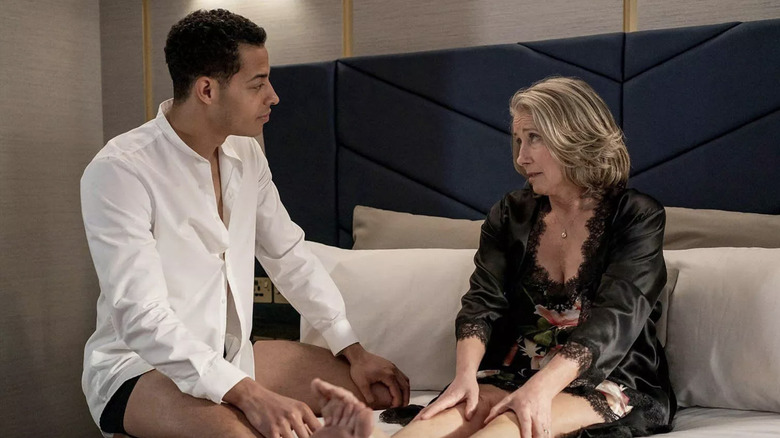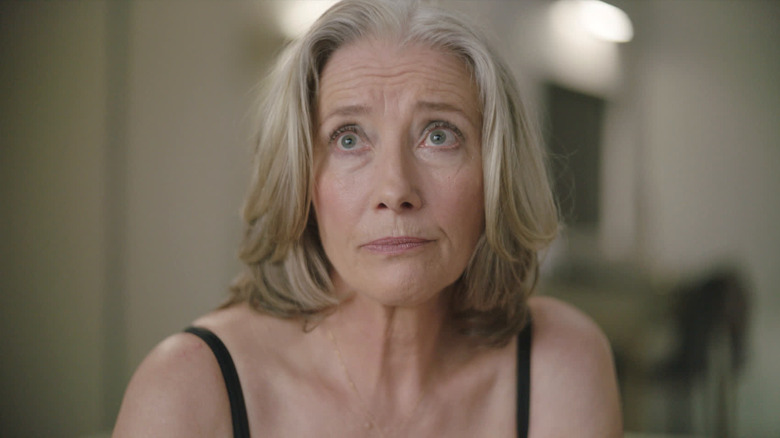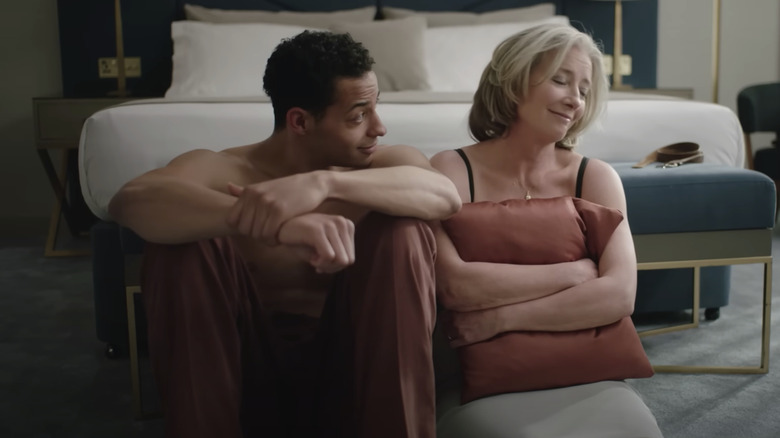The Surprising Way The Director Of Good Luck To You, Leo Grande Made Actors Comfortable For A Sex Scene
When we first meet Emma Thompson's Nancy in "Good Luck To You, Leo Grande," you can feel her anxiety radiating off the screen. After faking orgasms with her now deceased husband for over three decades of marriage, Nancy has sought out the company of a full service sex worker, the young, irresistibly sexy, and effortlessly cool Leo Grande (Daryl McCormack). The film is a tart and touching tale of the way we pursue intimacy and the social barriers that often trap women into a life lacking pleasure, told almost exclusively through the two leading players. The chemistry between Thompson and McCormack is palpable, and when the two finally engage in sexual acts, it's hard not to feel like a voyeur intruding into a private session.
There's been a disappointingly frequent and puritanical push as of late by those who believe film and television should eliminate sex scenes, a truly backwards mindset that would only continue the stigma surrounding what is a very normal and important aspect of life. The way we engage (or do not engage) with sex and sexuality are an essential part of the human experience, and it's more important than ever to continue telling these stories. It's a mindset shared by both "Good Luck To You, Leo Grande" writer Katy Brand and director Sophie Hyde, who went above and beyond to ensure that both Thompson and McCormack were as comfortable as possible while making this film.
Introducing the body through what they do, not what they look like
Hyde first began private rehearsals with Thompson and McCormack with the intention of getting them all comfortable with one another and establishing a safe working environment. "One of the great things that I'm trying to do in rehearsals is get them to feel connected to each other and to feel comfortable with each other, so that by the time they have to be intimate, that feels natural," Hyde said in an interview conducted by /Film.
The trio explored their bodies by talking about them, talking about intimacy in general, sharing personal stories, and when the time was right, the three of them privately shared space together, resulting in full nudity. Hyde, Thompson, and McCormack went through a process where they would slowly disrobe and introduce their bodies to one another through what they do or have done, rather than what their bodies look like.
"It was like, 'Oh, here's my foot. I love how I run every day.' Or 'Here's my elbow. I got a big scar on there, and that was a really important time in my life,' or something. So that was getting them ready to be intimate, and then they rehearsed, and they were doing sex positions and everything.
Hyde tells us that the duo expressed that the last few days of shooting were bliss, where they were mostly naked and filming scenes without much dialogue. "They were suddenly like, 'Oh, heavenly, we'll just lay around and do these things and not have to do 12 pages of dialogue or whatever.'"
Community bonding through nudity
In my early 20s, I was cast in a production of the musical "HAIR," and our director followed the same rehearsal process as Hyde. We spent many rehearsals building a community of trust and security, before eventually getting to a place where we felt safe enough to interact with one another while nude. There's nothing inherently sexual about nudity, but given the way society has warped all of our brains into thinking our bodies are something to be ashamed of, finding that level of comfortability can be difficult. In many cases, studios and productions hire intimacy coordinators, but according to an interview with Daryl McCormack and Variety, the particular process for this film didn't require their services.
"Intimacy coordinators are really important, and their work is so valuable and so useful and needed, but at the same time, we were able to come to each other and go, 'What do you think is going to best serve our relationship with this?'" said McCormack. "We just found that out of the safety and out of the connection that we had already found, it felt really exciting to us to actually build that ourselves with the director."
So much of the mainstream entertainment we're given has been algorithmically commodified to the point where people may forget that the relationship crafted between a quality director and their cast can make all the difference in the world. The brilliant performances in "Good Luck To You, Leo Grande" and the overwhelmingly positive things the cast has had to say about the process is proof positive that Sophie Hyde is a vital director in the industry.


